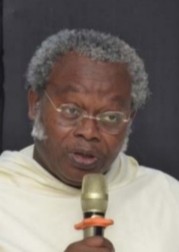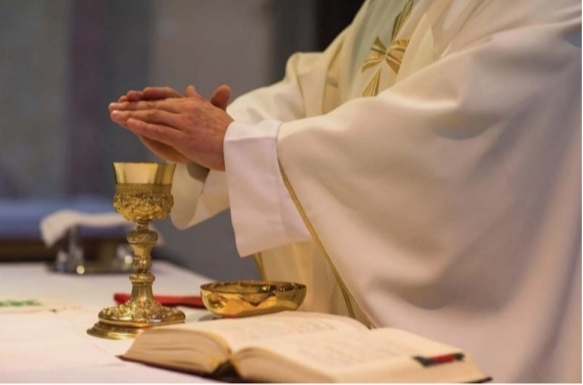
In the Catholic tradition, we begin and end our prayers by making the sign of the cross, and by invoking the three persons in one God. At the beginning, and at the end of our prayers, we gratefully recall all that the cross signifies. Our salvation on the cross was not just the work of the Son but of the whole Trinity. The three persons in one God—Father, Son and Holy Spirit—were active in the drama of the cross. The Holy Spirit, the love of the Father and the Son, inspired the Son to show the greatest act of love by being obedient to the Father even to accepting death on the cross.
That is why we make the sign of the cross and invoke the name of the Trinity at the beginning, and at the end of our prayers. The cross has two sides, and, as Gregory of Nyssa said: “with regard to the cross, we should not notice the one aspect and overlook the other. We should see the human element in the death, but try to penetrate the divine significance in the way it occurred.” We need to understand the sign of the cross in the mystery of God’s love. The cross signifies cruelty and punishment, injustice and defeat. But the death of the Son of God on the cross transformed the cross.
And so, when we begin our prayer with the sign of the cross, we begining by recalling the love of God The cross, sign of punishment has been transformed into a sign of forgiveness. God turned the death of his Son on the cross into an occasion of life-giving love. The cross, wood of hatred and cruelty, has been transformed into a revelation of God’s tender love for sinners. The sign of injustice has become a sign of justice. God used the death of his Son to unite us to himself, to restore order in our relationship with him. And this restoration of order in our relationship with God, that is what justice is.

Justice is not vengeance but rectification of relationships strained by sin, strained by selfishness. The cross, sign of defeat, has become a sign of victory, sign that evil has been conquered. Jesus said to Nicodemus in the Gospel of this Mass: “the Son of Man must be lifted up as Moses lifted up the serpent in the desert, so that everyone who believes may have eternal life in him.” That statement alludes to the bronze serpent in the Book of Numbers, in the First Reading of the Mass of Exultation of the Cross, when Moses was instructed to make the serpent.
“If anyone is bitten [by serpents] and looks at it, he shall live.” And so, the serpent, cause of death, was transformed into a cause of life for the Israelites. The serpent bit them and killed them. But the same serpent, made of bronze, would save them from death. The statement Jesus made to Nicodemus also alludes to the cross. The cross, instrument of humiliation, will become the instrument of elevation of the Son of God, instrument of elevation of all those who believe in him. The cross, instrument of death, has become the sign of life. On it, the Son of Man must be lifted so that we would be lifted. On it he would be crucified, on it he would die so that we might live.
On the cross he would no longer look human. He would, as described for us by the prophet Isaiah in the First Reading on Good Friday, be deformed by suffering so that we can be transformed. And so, we chant in the liturgy every year on Good Friday: “Ecce lignum crucis in quo salus mundi pependit.” Behold the wood of the cross on which hung the salvation of the world. The cross is the tree on which the fruit of salvation is found. On the cross, the fullest meaning of the words of Jesus to Nicodemus are revealed, words in which he said: “God loved the world so much that he gave his only Son, so that everyone who believes in him may not be lost but may have eternal life. For God sent his Son into the world not to condemn the world, but so that through him the world might be saved.” And those who believe in the crucified and risen Christ will be saved unto eternal life. The cross was instrument of execution of slaves. Jesus, the Son of God, accepted to die on it.
And so, on the cross, as St Paul teaches us in the Letter to the Philippians, Jesus assumed the condition of a slave so that humanity, enslaved by sin, will be liberated from sin. “Never forget the deeds of the Lord,” says the Psalmist. It is an admonition to remember the miracle of the cross, the salvific change that the cross brings into our lives, an invitation to remember that the love of God is given to us from life nailed to the cross. St Andrew of Crete wrote: “if life had not been nailed to the cross, there would have been no streams of immortality pouring from Christ’s side, blood and water for the world’s cleansing… Had there been no cross, death would not have been trodden underfoot, nor hell despoiled…. “The cross is honourable because it is both the sign of God’s suffering and the trophy of his victory.
It stands for his suffering because on it he freely suffered unto death. But it is also trophy because it was the means by which the devil was wounded and death conquered; the barred gates of hell were smashed, and the cross became the one common salvation of the whole world” (Second Reading of Office of Readings on the Feast of the Exaltation of the Holy Cross). The greatest sign of the cross is the holy sacrifice of the Mass. In this sacrifice, water and blood, “streams of immortality” that flowed from the side of the Son of God as he hung on the cross flow into us. With and in this greatest sign of the cross that the Mass is, we call to mind the life-giving death on the cross, and we pray: “Saviour of the world, save us, you who by your cross and resurrection have set us free.”
• Father (Prof.) Anthony Akinwale, OP is the Vice Chancellor of Augustine University, Ilara-Epe, Lagos.





